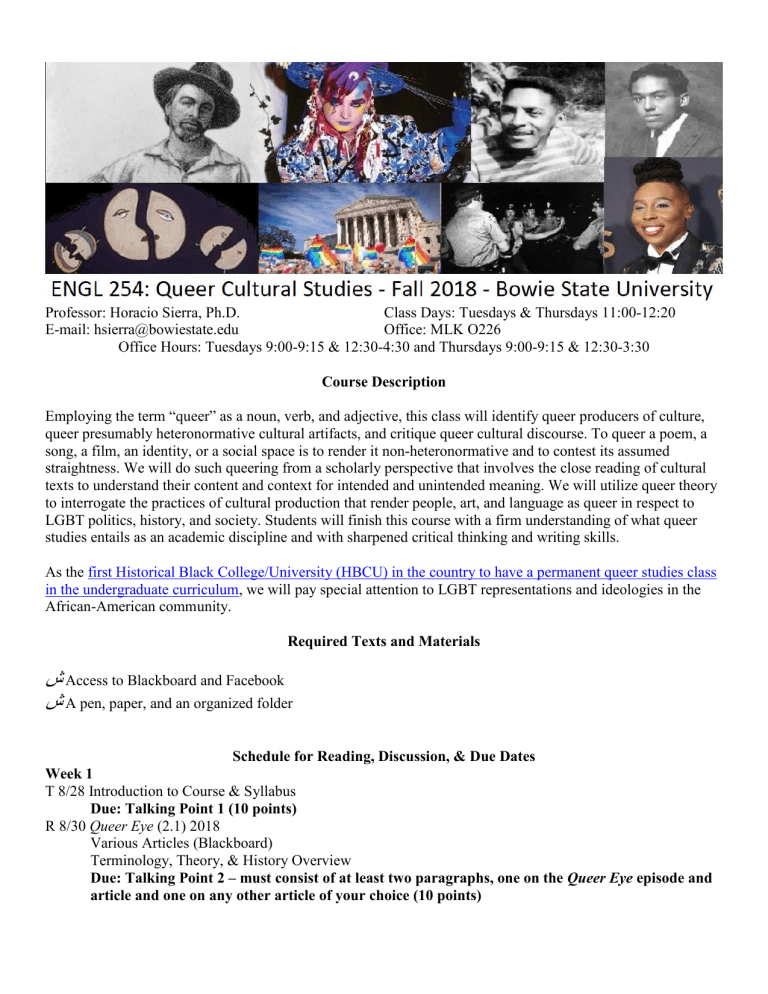
Professor: Horacio Sierra, Ph.D. Class Days: Tuesdays & Thursdays 11:00-12:20 E-mail: hsierra@bowiestate.edu Office: MLK O226 Office Hours: Tuesdays 9:00-9:15 & 12:30-4:30 and Thursdays 9:00-9:15 & 12:30-3:30 Course Description Employing the term “queer” as a noun, verb, and adjective, this class will identify queer producers of culture, queer presumably heteronormative cultural artifacts, and critique queer cultural discourse. To queer a poem, a song, a film, an identity, or a social space is to render it non-heteronormative and to contest its assumed straightness. We will do such queering from a scholarly perspective that involves the close reading of cultural texts to understand their content and context for intended and unintended meaning. We will utilize queer theory to interrogate the practices of cultural production that render people, art, and language as queer in respect to LGBT politics, history, and society. Students will finish this course with a firm understanding of what queer studies entails as an academic discipline and with sharpened critical thinking and writing skills. As the first Historical Black College/University (HBCU) in the country to have a permanent queer studies class in the undergraduate curriculum, we will pay special attention to LGBT representations and ideologies in the African-American community. Required Texts and Materials شAccess to Blackboard and Facebook شA pen, paper, and an organized folder Schedule for Reading, Discussion, & Due Dates Week 1 T 8/28 Introduction to Course & Syllabus Due: Talking Point 1 (10 points) R 8/30 Queer Eye (2.1) 2018 Various Articles (Blackboard) Terminology, Theory, & History Overview Due: Talking Point 2 – must consist of at least two paragraphs, one on the Queer Eye episode and article and one on any other article of your choice (10 points) 2 Week 2 T 9/4 Plato, “Aristophanes’s Speech” from Symposium Sappho Poems Aristotle, Excerpts from Book IV of Problematia Leila Rupp’s “Toward a Global History of Same-Sex Sexuality” Chrys Ingraham’s “Heterosexuality: It’s Just Not Natural!” Due: Talking Point 3 (10 points) R 9/6 “Debating Bible Verses on Homosexuality” from The New York Times “What Does the Bible Say About Homosexuality?” from LivingOut “There Are 6 Scriptures About Homosexuality in the Bible” from UpWorthy “Some Religious Groups Are Okay with Same-Sex Marriage” from Vox “The Secret History of Leviticus” from The New York Times “Chastity and Homosexuality” from Catechism of the Catholic Church Old Testament: Book of Ruth, Chapters 1-4 Old Testament: Book of 1 Samuel, Chapters 18-20 and Book of 2 Samuel, Chapter 1 This American Life podcast, Private Geography, Act 2 “Kids in the Hall” Due: Response Paper 1 (20 points) Week 3 T 9/11 Excerpts from William Shakespeare’s Twelfth Night Christopher Marlowe’s Edward II, Margaret Cavendish’s The Convent of Pleasure María de Zayas’s “Love for the Sake of Conquest” Quiz 1 Due: Talking Point 4 (10 points) R 9/13 Langston Hughes, “Blessed Assurance” Poems by Langston Hughes Gladys Bentley and Frankie “Half-Pint” Jaxon Biographies Linda Villarosa’s “The Gay Harlem Renaissance” from The Root Due: Talking Point 5 (10 points) Week 4 T 9/18 Marlon Moore’s “Black Church, Black Patriarchy, and the ‘Brilliant Queer’: Competing Masculinities in Langston Hughes’s Blessed Assurance” A.B. Christa Schwarz’s Gay Voices of the Harlem Renaissance excerpt Patricia Collins’s “Prisons for Our Bodies, Closets for Our Minds: Racism, Heterosexism, and Black Sexuality” Angela Helm’s “Comedian Marsha Warfield . . .” from The Root Quiz 2 Due: Talking Point 5 (10 points) R 9/20 Brother to Brother F 9/21 Due: Online Discussions Period 1 (1 original post, 1 response to peer, 1 response to professor) Week 5 T 9/25 “Milestones in the American Gay Rights Movement” “Camp” Susan Sontag’s “Notes On Camp” “Gay Icon: Marilyn Monroe” Due: Response Paper 2 on Brother to Brother (20 points) Due: Talking Point 6 (10 points) 3 R 9/27 Henry Louis Gates Jr.’s “Bayard Rustin” Ernestein Eckstein interview in June 1966 issue of The Ladder Alvin McEwen’s “The Erasure of Gay from Black History Must Stop” Bowery Boys’ “Sip-in Shenanigans: Before Stonewall There Was Julius’” NPR’s “Remembering a 1966 'Sip-In' for Gay Rights” Jim Farber’s “Before the Stonewall Uprising, There Was the ‘Sip-In’” Kirsten Appleton’s “What It Was Like at the First Gay Rights Demonstration Outside White House” Quiz 3 Due: Talking Point 7 (10 points) Week 6 T 10/2 Sherry Woolf’s “Stonewall: The Birth of Gay Power” Chris Carlsson’s “The Castro: The Rise of a Gay Community” June Thomas’s “The Gay Bar: Why the Gay Rights Movement Was Born in One” Jeremy Gray’s “Selma and Stonewall: What Ties Bind 1960s Civil Rights Movement, Today’s Gay . . .” Julio Capó’s “Why a Forgotten KKK Raid on a Gay Club in Miami Still Matters 80 Years Later” Truth in Progress Due: Talking Point 8 (10 points) R 10/4 YouTube “AIDS at 30: The U.S. Epidemic” by the Kaiser Family Foundation “Revolt/Backlash/Resistance” 216-35 from Michael Bronski’s A Queer History of the United States VICE TV’s “The End of HIV? The Truvada Revolution” Due: Talking Point 9 (10 points) Quiz 4 Week 7 T 10/9 How to Survive a Plague R 10/11 RENT Week 8 T 10/16 Andres Mario Zervigon’s “Drag Shows: Drag Queens and Female Impersonators” Ben Rimalower’s “. . . History of Drag in Theatre” from Playbill Amelia Abraham’s “A Brief History of Drag in the Art World” from Artsy.net Chris Godfrey’s “When Drag is Activism” from The Advocate Hazel Cills’s “The History of Drag Kings” from Jezebel Hazel Cills’s “As Drag Becomes More Popular Than Ever, Drag Kings Refuse to Be Ignored” Due: Response Paper 3 on How To Survive A Plague (20 points) Due: Response Paper 4 on RENT (20 points) Due Talking Point 10 (10 points) R 10/18 Guest Speaker: Mary Washington, Maryland State Assemblywoman, District 43 Paris Is Burning Week 9 T 10/23 bell hooks’s “Is Paris Burning?” Lauren Levitt’s “Reality Realness: Paris Is Burning and RuPaul’s Drag Race” Spencer Kornhaber’s “The Fierceness of ‘Femme, Fat, and Asian’” Due: Talking Point 11 (10 points) R 10/25 Jenna Wortham’s “Is RuPaul’s Drag Race the Most Radical Show on TV?” RuPaul’s Drag Race Due: Talking Point 12 (10 points) S 10/28 Due: Midterm Exam via email 4 Week 10 T 10/30 Jacob Bernstein’s “Production of a Lifetime: Whitney Houston and Clive Davis” Tricia Romano’s “Whitney Houston: Anatomy of a Lesbian Rumor” Chris Azzopardi’s “Janelle Monae Q&A: The Gay Interview” Victoria Patneaude’s “They’re Coming Out: A History of Gay Musicians” K.T. Billey’s “Prince and the Queer Body” Chelsea Reynold’s “I’m a Gender and Sexuality Scholar. Here’s How the Media Blew it On Prince” Due: Talking Point 13 (10 points) R 11/1 Due: Online Discussions Period 2 (1 original post, 1 response to peer, 1 response to professor) Week 11 T 11/6 Erica Johnston’s “The Gay Moment” Thomas Roger’s “The Invention of the Heterosexual” George Chauncey’s “‘What Gay Studies Taught the Court’: The Historians’ Amicus Brief in . . .” Michael Hobbes’s “The Epidemic of Gay Loneliness” Due: Talking Point 14 (10 points) Quiz 5 R 11/8 Guest Lecturer: Anthony Abate, U.S. Peace Corps “Gay Rights Are Human Rights: Reflections on Navigating LGBT Issues as a Peace Corps Volunteer” Various Articles Due: Talking Point 15 (10 points) Week 12 T 11/13 National Geographic – January 2017 Issue; Due: Talking Point 16 (10 points) R 11/15 Kate and Deeg’s “Marriage is Still the Opiate of the Queers” Kenyon Farrow’s “Is Gay Marriage Anti-Black???” Dylan Lewis’s “My Family Didn’t Accept Me. Ole Miss Did.” “Coming Out” statements of Ellen DeGeneres, Anderson Cooper, Ricky Martin, and Frank Ocean Due: Talking Point 17 (10 points) Quiz 6 Week 13 T 11/20 “Trans Terminology” from Digital Transgender Archive and GLAAD “Milestones in the American Transgender Movement” from The New York Times “Gathering History: The Digital Transgender Archive” from PBS “An Oral History of Transgender Representation on Scripted TV” from Out Lisa Davis’s “My Daughter Is Not Transgender. She’s a Tomboy.” from The New York Times Doriane Coleman’s “Sex, Sport, and Why Track and Field’s New Rules on Intersex Athletes . . .” Due: Talking Point 18 (10 points) R 11/22 Happy Thanksgiving! Week 14 T 11/27 Presentations Group Work R 11/29 Presentations Group Work F 12/1 Due: Online Discussions Period 3 (1 original post, 1 response to peer, 1 response to professor) Week 15 T 12/4 Presentations R 12/6 Presentations; Due: Final Exam 5 Final Grade Breakdown 18 Talking Points (10 points each) 4 Response Papers (20 points each) 6 Quizzes (30 points each) Final Group Presentation & Handout (100 points each) Online Discussions (11 points per post/comment) Midterm Exam Final Exam Writing Center Visit Maximum 180 80 180 200 99 120 121 20 1,000 Grading Scale for Final Grade Points 900-1,000 800-899 700-799 600-699 0-599 Grade A B C D F Talking Points and Response Papers This class will be as exciting as the texts, you, and I can make it. You must complete the day’s readings before coming to class. Most classes will begin with me asking you questions about the day’s content. I expect you to have closely read and seriously thought about the day’s assigned texts as well as their relationship to previously read texts. Students cannot earn an “A” in the course without actively participating in it via class discussion. I value students who contribute to class discussion with thoughtful comments, questions, and opinions in a courteous manner that appreciates the communal spirit of the humanities classroom. Class discussions will be facilitated using the Socratic method. Each student must bring in one typed Talking Point on the days that they are due. Check Blackboard for an example of a Talking Point that would earn 10 points. Each Talking Point must include a quote from one of the day’s assigned readings and a paragraph-length discussion about the quote. Talking Points will be collected at the beginning of class for credit. In the case that I provide a specific set of questions or a prompt for the next class, you will submit a typed Response Paper instead of a Talking Point. Some days you may be required to write a Talking Point for each assigned reading. Late Talking Points and Response Papers lose half of their points potential per 24-hour period. Hence, if a Talking Point is due on Tuesday at 11:00 am and you submit it on Tuesday at 5:00 pm, the maximum points it can earn is 5 points. If that same assignment is submitted after 11:00 am on Thursday, it will be returned without comment and earn a “0.” Quizzes Quizzes will be administered at the beginning of class. Make-up quizzes will not be given if you are late. It is your responsibility to schedule a time to make up a quiz if you have an excused absence for which you missed it. Online Discussions To improve your critical and analytical reading skills in an online format, you will join the class’s private Facebook page – “ENGL 254 Fall 2018 BSU.” This assignment is designed to hone your online writing skills as it pertains to a public discussion of intellectual and/or cultural issues in an electronically fluent society. Over the course of the semester you must create three original posts and comment on three posts written by others. You must also comment on at least three of my posts. Posts and comments must each be at least five sentences in 6 length. There will be three due dates throughout the semester for each of the three original posts, peer post comments, and professor post comments. You cannot make up missed posts or comments; each one of the three is due by its given deadline. These posts can be original musings, thoughts, and conjectures about the topics we have discussed in class. Such posts must be at least five sentences in length and include a prompt or question to elicit responses from your classmates. Your post can also take the form of a link to a news article or YouTube video related to class content. Such posts must still include at least five sentences of commentary on your part with a prompt or question for your peers. An example of such a post may be a news article about the latest development in nondiscrimination laws or a music video that reflects non-conforming gender roles. The possibilities are endless. Have fun with your posts and frame it within an intellectual context. All writing and content posted on this page must follow the standard ethical and behavioral decorum of a college classroom. Remain civil and avoid ad hominem attacks. When you are online, you should behave as you would in the classroom. You will receive a grade based on the quality of each post and comment. To protect your online privacy, you can feel free to create another Facebook identity for this group. Final Group Presentation & Handout You will be responsible for a fifteen-minute oral presentation either by yourself or in teams of two or three. I will provide you with a range of possible topics or you can choose your own upon conferring with me. You must produce a one-page handout that covers the most salient information from your presentation. This handout must include a bibliography of the sources you consulted when conducting your research. You must email me a draft of your presentation and handout at least seventy-two hours before you present. There is also the option for one person or pair of students to create a library exhibit. Other options include a podcast, video, or poster presentation. Midterm Exam The Midterm Exam will be a take-home essay. More details will be given as the date nears. Final Exam The final exam will be a take-home essay. More details will be given as the date nears. Writing Center Visit You are required to visit the Writing Center for a one-on-one session. You can work with a Writing Center Consultant at any step of the writing process: brainstorming, outlining, drafting, revising, etc. You can earn a maximum of 20 points for visiting the Writing Center. If you visit by October 15, you will earn 20 points. If you visit by December 3, you will earn 10 points. You cannot earn any points if you visit after December 3. Ask me for a Writing Center Consultation Ticket so you can get credit for the assignment. ADA Statement Students with disabilities or who need special assistance or accommodation should contact Dr. Michael S. Hughes in the Office of Disability Support Services located in the Thurgood Marshall Library, Room 082, mhughes@bowiestate.edu, or at (301) 860-4067. General Grading Rubric The following is a grading rubric that provides an approximate meaning for the grades you earn for your work: A: You did what the assignment asked for at a high-quality level, and your work shows originality and creativity. Work in this range shows all the qualities listed below for a B, but it also demonstrates that you took extra steps to be original or creative in developing content, solving a problem, or developing a style. Since 7 careful editing and proofreading are essential in writing, papers in the A-range must be free of substantial typos and grammatical or mechanical errors. B: You did what the assignment asked of you at a high-quality level. Work in this range needs revision; however, it is complete in content, organized well, and shows special attention to style. C: You did what the assignment asked of you. Work in this range needs significant revision, but it is complete in content and the organization is logical. The style is straightforward but dull. D: You did what the assignment asked of you at a poor-quality level. Work in this range needs significant revision. The content is often incomplete and the organization is hard to discern. Attention to style is often scant or chaotic. F: Your work does not meet the assignment’s requirements. Office Hours & Email Students must check their email once a day. My office hours are for you. I encourage you to stop by if you want to discuss texts and ideas, have questions about your progress in the course, or if you have any other class-related concerns. I also advise bringing drafts of your papers to my office hours so we can discuss them on a one-on-one basis. If my office hours do not work for you, please contact me so we can schedule a better time. Email is the best way to reach me. However, do not expect to receive replies during the late evening or at night. Likewise, do not expect quick replies on weekends. Writing Center The Writing Center helps Bowie State University students become stronger and more confident writers. Through one-on-one sessions with writing consultants, you will be empowered to overcome challenges in any stage of the writing process. Come with your assignment, your draft, and your questions. Visit the Writing Center in Room 204 of the MLK Building. The Writing Center can be reached via phone at (301) 860-3720 or via email at writingcenter@bowiestate.edu. For more information, go to www.bowiestate.edu/writingcenter. Attendance and Tardiness Upon your fourth unexcused absence, your final course grade will be lowered one letter grade. Upon your fifth unexcused absence, your grade will drop another letter grade. Upon your sixth unexcused absence, you will fail the class. Excused absences may be granted due to family or personal health emergencies, certain academic and athletic events, and significant religious holidays. These absences are excused only if they are documented to my satisfaction. If possible, please talk to me about your absence before you miss class. Work is still due the date of the absence except in exceptional circumstances. You are responsible for keeping yourself up-to-date on class discussions, readings, and assignments. Being more than five minutes late to class or not bringing with you a hard copy of the day’s text when requested will count as an unexcused absence. Please note that arriving at 11:35 counts as late since five minutes have expired at that second. Plagiarism You commit plagiarism when you present the ideas or words of someone else as your own. You are responsible for understanding the university's definitions of plagiarism and academic dishonesty, which include the following: *Submitting all or part of someone else’s work as if it is your own 8 *“Borrowing,” without crediting the source, any of the following: • Any part of another person’s essay, speech, or ideas • Any part of an article in a magazine, journal, newspaper • Any part of a book, encyclopedia, web page, etc. • Any idea from another person or writer, even if you express that idea in your own words • Any part of song lyrics, poetry, or movie scripts *Copying verbatim text without enclosing it in quotation marks and citing the source. *Collaborating or receiving substantive help in writing your assignment unless such collaboration is part of the given assignment (However, you may receive general advice from tutors.) * Failing to cite sources, or citing them improperly. Important Tip: You should never copy and paste something from the internet without providing the exact location from which it came. Consult me if you are not sure what constitutes plagiarism. Plagiarism will be reported to the Academic Dean’s office as outlined in the Student Handbook. All acts of willful and inadvertent plagiarism will result in a “0” for that particular assignment and will likely result in failure of the entire course. Classroom Behavior Turn your electronic devices to silent and put them away while class is in session. Notify me if you have a personal emergency for which you must monitor your electronic device. You will earn an unexcused absence if I must call out your use of electronic devices in class. I prefer that you do not use laptops or other computer devices in class. If you must use one due to a disability, please have the Coordinator of Disability Services notify me. No electronic audio or visual sounds or images from this class may be recorded or transmitted without my written consent. Free printing is available in the library. Respect everyone in the classroom as you would want to be respected. Do not speak out of turn.
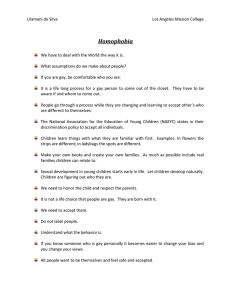
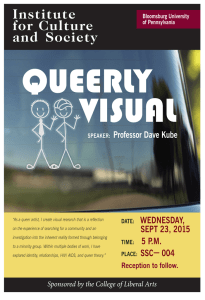
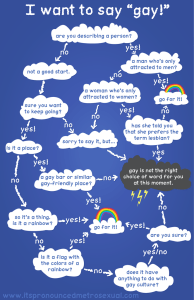
![-----Original Message----- [mailto:] Sent: Tuesday, March 15, 2005 4:00 PM](http://s2.studylib.net/store/data/015587023_1-54e94fc602323868fe7d0334a40d4ded-300x300.png)
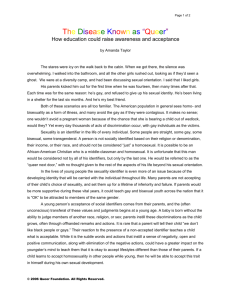
![-----Original Message----- From: Bill Cooper [ ]](http://s2.studylib.net/store/data/015588360_1-d4b352c98594c85a1d0deed4a50231da-300x300.png)